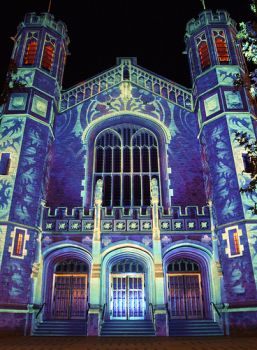Today, we have a guest feature by Don from Classic Poetry Aloud (iTunes — Feed — Web Site), a place where you can find a great lineup of poetry podcasts. We welcome other guest contributors. So, if you’re interested, just email us. Take it away (and thanks) Don…
The internet has given poetry new scope and a new freshness. It’s almost like the ‘70s, when punk fanzine readers were famously told ‘Here are three chords, now form a band’. Today, the injunction could be: ‘Here are three web sites, now perform some poetry’.
And the emphasis would very much be on performance, with readings taking place on blogs (individually) and at poetry slams (collectively).
But an interest in poetry readings is not confined to new work. My own daily poetry podcast, Classic Poetry Aloud, is dedicated to anything in the English language that is out of copyright, and attracts listeners on every continent.
While podcasts such as Classic Poetry Aloud (see a November Open Culture posting for a listing of poetry podcasts) feature a range of poets, the internet also offers a wealth of recordings of celebrated authors reading from their own work.
The BBC has a wonderful series of such recordings at Poetry Out Loud. My favourites include: Men and their Boring Arguments by contemporary British poet Wendy Cope, and an excerpt from Tennyson’s celebrated Charge of the Light Brigade, originally recorded in 1890 on a wax cylinder by Edison. In addition, the BBC has a series of interviews with poets discussing their work.
The Academy of American Poets’ listening booth offers more than 150 original readings. As well as the rolling tones of Dylan Thomas reading Do not go Gentle into that Good Night, there is Robert Frost’s The Road not Taken, and Gwendolyn Brooks’ We Real Cool – complete with an illuminating, humorous, wry introduction. This is an unashamed show stopper reading of a poem that runs to just 24 words.
Indeed, one of the joys of listening to poets reading from their own work is often the comments and insights that they offer. T.S. Eliot does this in introducing The Journey of the Magi, one of three of his poems to feature on the Poetry Archive. On this site, there are over 200 poems that feature some form of introduction by the poet.
The Poetry Archive is an ambitious project set up by British poet laureate Andrew Motion to capture poetry readings. The range here is so vast that it is impossible to say how many poems are featured on the site, but it makes for an invaluable resource, with poems accessible by theme as well as by form.
Among British poets is former laureate John Betjeman, apparently unable to remember the title of the poem he is best remembered for – A Subaltern’s Love Song – and he jokes with his audience before launching into a characteristically brisk and warm rendition. Not all of the Poetry Archive comes from the UK, though, and Allen Ginsberg reads three poems, including A Supermarket in California.
Author Andrew Keen has claimed that the internet is ‘killing culture’. That’s a good, alliterative tag line to sell books, but the growing popularity of poetry on the net shows that it’s also far from the truth.


